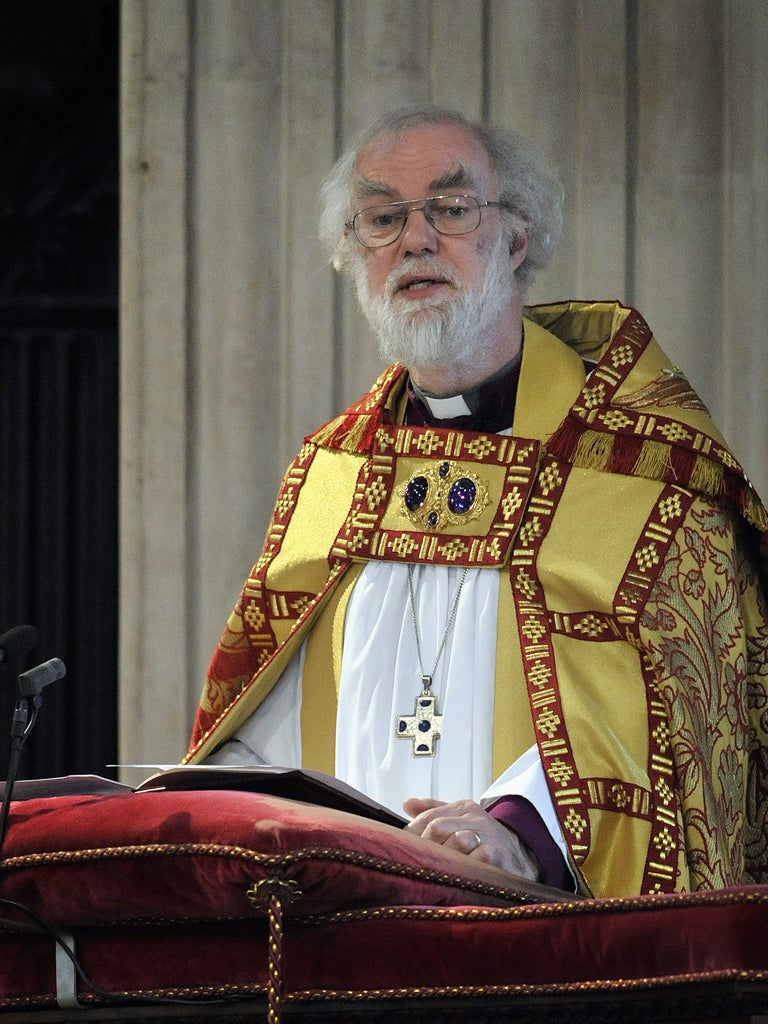Vote for women bishops or face further turmoil within the Church, Archbishop of Canterbury Dr Rowan Williams warns

The Archbishop of Canterbury has pleaded with Church members to vote in favour of women bishops in a last ditch attempt to seek closure on a contentious issue that has dominated his time in office.
Next month the Church’s legislative body – the General Synod – gathers for a make or break vote on whether women can join the highest echelons of the clergy. Failure to reach an agreement after nearly a decade of bitter wrangling would be an ignominious end to Dr Rowan Williams, who leaves his post at the end of the year.
In a powerful plea to his followers, the Archbishop has warned that a failure to approve women bishops could embarrassing for the Church and lead to “a period of continued and perhaps intensified internal conflict.”
The Archbishop is a supporter of women bishops but has angered many liberals by his determination to find a compromise for those who object on theological grounds. Many blamed the near collapse of the legislation approving women bishops on a last minute amendment that was tabled by the Archbishops of Canterbury and York which strengthened protections for those who refuse to be administered to by a woman.
After looking almost certain to pass following consecutive votes approving women bishops with minimal protections for traditionalists, the legislation began to flounder. Those opposed to women bishops, a small but vocal minority, argued that the protections were not good enough while the pro-women lobby felt that they were suddenly being asked to endorse a two tier system.
In a short essay published on the Lambeth Palace website, Dr Williams accepted that there were many who find the legislation unpalatable but he urged those who were wavering to put aside their differences.
“The legislation is not perfect,” he said. “All legislation for complex communities embodies compromise and unfinished business. The tough question, for those who are still undecided, is whether delay would produce anything better.”
He also had a stark warning for what might happen if the legislation approving women bishops fails. “Voting against the legislation risks committing us to a period of continued and perhaps intensified internal conflict, with no clearly guaranteed outcome,” he said. “For those who find [the legislation] not quite good enough, or not quite simple enough, the question must be “What are you voting for, if you vote against this Measure?” And what if you decide that answer is, uncomfortably, a period of publicly embarrassing and internally draining indecision.”
Many bishops are acutely aware that any failure to break the final glass ceiling for women clergy more than two decades after they were allowed to become priests would be a disaster for the image of the Church in the eyes of the public. But at the same time they are desperate to avoid a mass walk out by traditionalists, conservative evangelicals and Anglo-Catholics who believe the Bible teaches that a woman cannot be a church leader.
In his article, Dr Williams claims that women bishops would be beneficial for a number of reasons. He argues that it would benefit women who would be “assured in more than words alone that their baptismal relationship with Jesus Christ is not different or inferior to that of men.” He added that it would liberating for men to enjoy gender equality and would be good for the Church because it would show the world that it “is not speaking a language completely remote from its own most generous and just instincts.”
Subscribe to Independent Premium to bookmark this article
Want to bookmark your favourite articles and stories to read or reference later? Start your Independent Premium subscription today.

Join our commenting forum
Join thought-provoking conversations, follow other Independent readers and see their replies